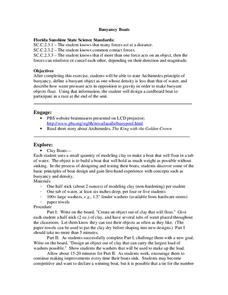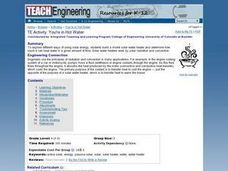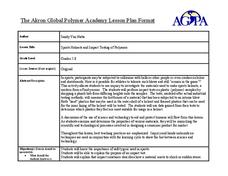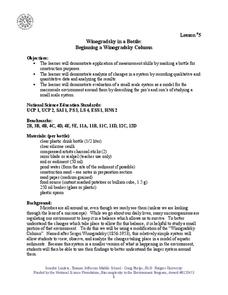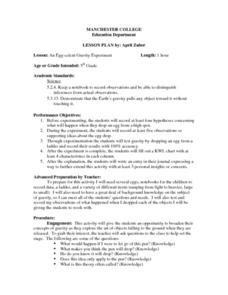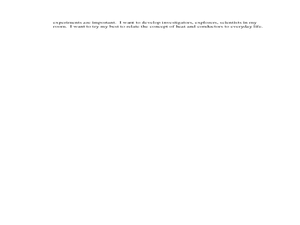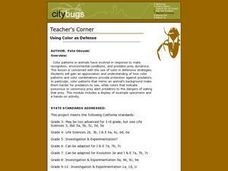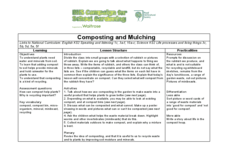Science Matters
Earthquake Building/Shaking Contest
Japan is one of only a handful of countries that constructs buildings that are almost earthquake proof. The 13th lesson in the 20-part series challenges scholars to build structures to test against earthquakes. With limited materials and...
Science 4 Inquiry
Levitation Engineers: Exploring Forces
Levitation tricks have been documented from the early 1900s, so how do they do it? Scholars learn about the force of magnetism in an attractive resource. They watch videos and design experiments to understand the strength and...
NASA
The Cycle of Matter
An educational lesson focuses on the idea of conservation of matter through a demonstration of the water cycle, a discussion of digesting food, and the path of carbon and oxygen atoms as they change form.
Curated OER
Folds in the Earth
Ninth graders demonstrate the forces that cause folds in the earths crust by use of clay modeling. They demonstrate there knowledge of terminology and concepts related to Earths folding processes by a written or oral report on data...
Center for Precollegiate Education and Training
Buoyancy Boats
What did the sea say to the boat? Nothing, it just waved. An inquiry-based lesson starts with a simple concept on the Archimedes Principle and challenges pupils to make something out of clay that floats. Then, they design...
NASA
Producers Make Their Own Food
During an inquiry-based lesson plan, scholars decide which variable to test and then design an experiment to determine the needs of producers. After two weeks, they complete a full analysis and research paper.
Columbus City Schools
Geological Effects of Plate Tectonics
Don't get your classes all shook up about plate movement, instead use a thorough unit that guides learners to an understanding of plate tectonics. The lessons incorporate a study of the types of plate boundaries and their effects on the...
Columbus City Schools
Experiencing Eclipses
Don't be caught in the dark! Young scientists investigate the causes of both solar and lunar eclipses using an interactive to help them understand the development of an eclipse over time. They then research facts and characteristics...
Curated OER
Experience the 5E Instructional Model with Electrical Circuits
Students build electrical circuits. In this lesson teaching pre-service teachers how to use the 5E instructional model, students use materials to explore how to create an electrical circuit.
Curated OER
TE Activity: You're in Hot Water
Students study different ways of using solar energy. They design a solar water heater and determine how much water it can heat in a set amount of time. They examine how the heaters work by solar radiation and convection.
NASA
Decomposers Get Energy From Dead Things
When life gives you mold, make penicillin. Scholars design an inquiry experiment to determine what causes rotting and mold growth. It also covers decomposers and the important role they play for other living things.
Curated OER
Sports Helmets and Impact Testing of Polymers
Students examine the importance of good quality safety gear. In this investigative lesson, students will tests various polymers, collect data, and analyze the data to determine which polymer is best for safety helmets. They will design a...
Curated OER
Winogradsky in a Bottle: Beginning a Winogradsky Column
Students study changes in the environment using a microscale experiment. In this environmental science lesson, students construct a modified "Winogradsky Column" to observe bacteria activities. They record observations and formulate a...
Curated OER
Water Resource Engineering
Students examine solubility and the significance of water. In this aqueous solution lesson students complete a lab activity on soil profiles.
Curated OER
Salt Marsh in a Pan
Students create a model of a salt marsh to discover the impact of pollution and human activities on water-based habitats including bays and the ocean. They recognize the relationship between natural and developed areas. Students impact...
Curated OER
Energy Audit
Students collect data about energy usage and use mathematical calculations to analyze their data. In this energy conservation and statistics math lesson, students survey their homes to complete an energy usage worksheet. Students...
Curated OER
Ramps
Students experiment to see how various objects roll down ramps. In this ramp lesson, students observe weight, size, and material of objects. Students compare speeds by using a second ramp.
Curated OER
An Egg-celent Gravity Experiment
Fifth graders record at least four hypotheses concerning what happens when they drop an egg from a high spot. They record at least five observations or supporting ideas about the egg drop. Students test gravity by dropping an egg from a...
Curated OER
Heat Conductors
Students explore heat conductors. In this lesson on heat, students examine how heat passes through different conductors and how different materials contain heat.
Curated OER
Winogradsky in a Bottle: Beginning a Winogradsky Column
Students use their measurement skills by marking a bottle for construction purposes. They record qualitative and quantitative data and analyze their results. Students demonstrate evaluation of a small scale systems as a model for the...
Curated OER
What Influences Reaction Rate?
Learners study reaction rates, what determines how fast a reaction happens and how the chemical changes occur. In this reactions lesson students complete a lab where they use Alka-Seltzer to observe reaction rate and create a graph...
Curated OER
Weather, Sea Level Rise and Climate Change Course
Learners explain the impact of glacial melting to global climate change. In this environmental science lesson, students design an experiment to investigate the effect of salinity change to melting glaciers. They share their results to...
Curated OER
Using Color as Defense
Learners explore mimicry and crypsis, participate in hands-on predator-prey activity, and practice calculating averages and graph results in histogram.
Curated OER
Composting and Mulching
Second graders define composting and recognize what can be composted. In this composting and mulching lesson, 2nd graders classify objects or pictures as good or bad for composting. Students write a story about life in the compost...




